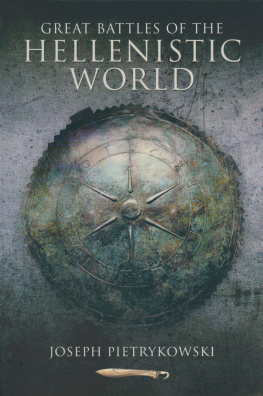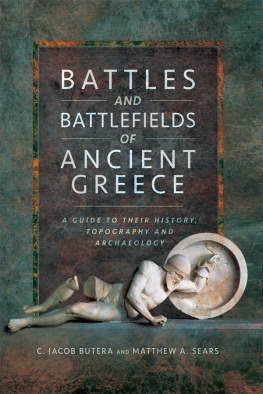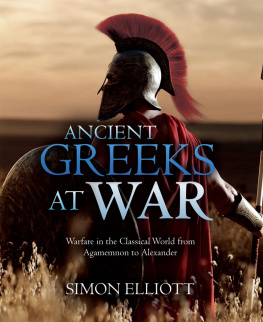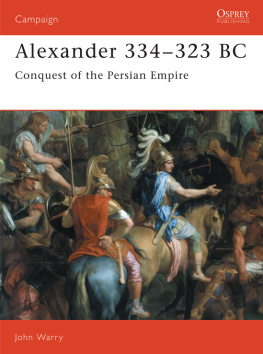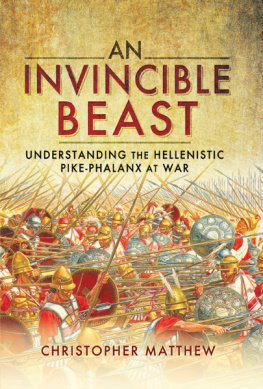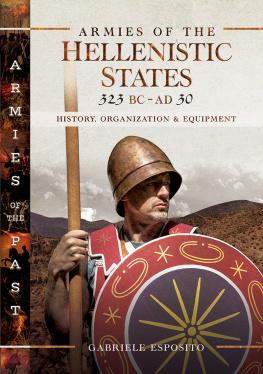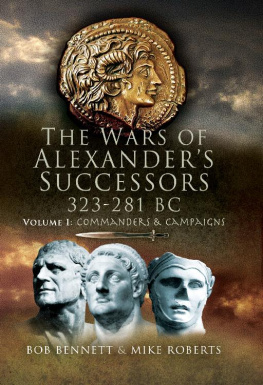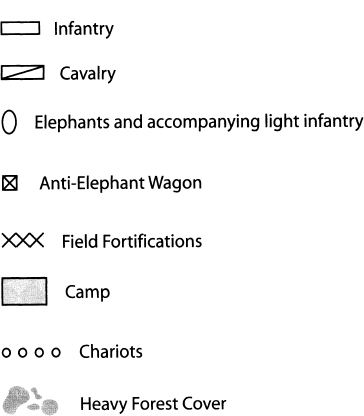Great Battles of the Hellenistic World
For Arthur Pietrykowski,
who saw the writer in me before I did.
Thanks Grandpa
Great Battles of the
Hellenistic World
Joseph Pietrykowski
First published in Great Britain in 2009
and reprinted in this format in 2012 by
PEN & SWORD MILITARY
An imprint of
Pen & Sword Books Ltd
47 Church Street
Barnsley
South Yorkshire
S70 2AS
Copyright Joseph Pietrykowski 2009, 2012
ISBN 978 1 84884 688 3
The right of Joseph Pietrykowski to be identified as Author of this work has been
asserted by him in accordance with the Copyright, Designs and Patents Act 1988.
A CIP catalogue record for this book is
available from the British Library
All rights reserved. No part of this book may be reproduced or transmitted in
any form or by any means, electronic or mechanical including photocopying,
recording or by any information storage and retrieval system,
without permission from the Publisher in writing.
Typeset in Ehrhardt 10/12 pt
Printed and bound in England
By CPI Group (UK) Ltd, Croydon, CRO 4YY
Pen & Sword Books Ltd incorporates the Imprints of Pen & Sword Aviation,
Pen & Sword Family History, Pen & Sword Maritime, Pen & Sword Military,
Pen & Sword Discovery, Wharncliffe Local History, Wharncliffe True Crime,
Wharncliffe Transport, Pen & Sword Select, Pen & Sword Military Classics,
Leo Cooper, The Praetorian Press, Remember When,
Seaforth Publishing and Frontline Publishing
For a complete list of Pen & Sword titles please contact
PEN & SWORD BOOKS LIMITED
47 Church Street, Barnsley, South Yorkshire, S70 2AS, England
E-mail: enquiries@pen-and-sword.co.uk
Website: www.pen-and-sword.co.uk
Contents
To begin with I would like to thank Larry Jones, a world-class teacher whose passion for history and desire to share his learning with others helped shape my life. With a second-hand copy of Thucydides he revealed to me the world of ancient history. For that I am eternally grateful.
I would also like to thank Dr Don Carrell for his support, encouragement and for enduring countless lengthy discussions which led me down the path I am on today.
To the queen of ILL, Beth Grimes, for whose astounding ability to locate the most obscure volumes, no less than for her continued enthusiasm and friendship, I owe a debt of gratitude that can never be fully repaid.
I would like to thank Paul Bardunias for his immensely useful criticism of portions of this work as well as his spirited discussions of ancient warfare in general.
Many thanks are due to Beejay Elles for his skilled map-making and patient guidance in the mysteries of graphics software.
For taking a chance on a first time author, and gently guiding me through the rigorous process of making a book, I am extremely grateful to my editor, Philip Sidnell, and to everyone at Pen & Sword Books.
I would also like to thank Elizabeth James for her skilful copy-editing and insightful critiques.
My deepest thanks to my family, who have encouraged and supported me every step of the way. I would especially like to thank my parents, Marlene and Patrick Pietrykowski, without whose love, encouragement and diligent proofreading this volume would not have been possible. I must also thank my brother Adam Pietrykowski for patiently reading and listening to my interpretations of events long past.
Finally, I would like to thank my wonderful wife Sarah for dealing with all the long hours, rambling monologues, midnight epiphanies and midweek dejection. I owe you more than words can express.
This project was originally conceived as a simple study of the Macedonian art of war beginning with its creator Philip II, then continuing on to the spectacular conquests of his son Alexander the Great, and concluding with the long, bloody squabbles of the Successor states and their struggle against the rising power of Rome. In detailing the complex evolution of the Macedonian system from its Balkan origins, however, I found myself growing increasingly preoccupied with the armys tactics and performance in battle. Unwilling to abandon my original goal, I eventually hammered out a compromise by shifting the focus slightly to chart the rise, reign and fall of the Macedonian phalanx as a dominant force on the battlefield by examining its role in many of the largest and most significant engagements of the era. By focusing on a number of far-flung encounters (geographically and chronologically), it is possible to observe the development of the forces, strategies and tactics employed by Hellenistic generals, while tracing the successes and failures of their military machine when facing new and powerful foes.
In attempting to bring these struggles to life for the enjoyment of the interested newcomer to history as well as the grizzled academic, I have focused on the average reader, avoiding much of the perplexing terminology that so often drives prospective students away from the study of the past. In addition to this, I have reconstructed and presented the various battles as realistically as possible. Understanding the sights, sounds and emotions of the ancient battlefield is an often-ignored prerequisite to understanding the temperament of the armies, the decisions of the commanders and the overall course of the action.
Purposefully limiting this work to include only the battles leading to the formation of the Macedonian empire of Alexander and those of his successors who struggled to carve out or preserve kingdoms of their own, this volume may justly be said to exclude substantial parts of the Hellenistic world. The decision to ignore the great Punic Wars and much of the early empire-building of Rome stems directly from my goal to trace the progress of the Macedonian phalanx over the course of its battlefield primacy. It was only with great consideration and careful thought that each of the battles which appear in the following pages was selected. Others, such as Megalopolis, Krannon, the Hellespont, Corupedion, the elephant victory, Apollonia, Panion, Kallinikos and Corinth were no less great in their own right, but were nevertheless excluded for reasons of faulty or incomplete sources and the subsequent impossibility of substantial and detailed reconstruction.
On a stylistic note, I preferred wherever possible to adhere as closely as possible to a strict transliteration of Greek names for ease of pronunciation.
The following symbols are used on the maps used throughout this book.
The Hellenistic World: A Landscape of War
The Hellenistic age was conceived as it was destined to perish, in the death-struggle of a people beset by enemies and worn down by generations of bloody strife. From beginning to end it was a time of unscrupulous opportunism, ceaseless conflict and jarringly pervasive change. Ironically, these same characteristics typify the man most directly responsible for bringing into being this chaotic period of history. Philip II, father of Alexander the Great and, more importantly, creator of the famed Macedonian phalanx, was above all a man whose genius was for victory by any means. Be it through force, diplomacy, bribery, intimidation or trickery, Philip pacified the ferocious Balkan tribes of the northeast and dominated the squabbling Greek city-states of the south to form the greatest empire Europe had yet known. Masterfully wielding his fearsome army and no-less fearsome reputation, Philip found Macedonia a nation of shepherds and farmers and left it a nation of warriors. His success, however, did not come without a cost.
Next page
